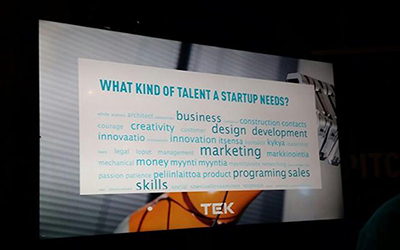
TEK took part in startup fever at Slush
On 11–12 November, the startup and technology event Slush attracted 15,000 visitors; entrepreneurs, investors, technology professionals and media representatives. TEK took part in the event, too.
Never before has it been such a good time to be a European entrepreneur. This was the leading idea for Niklas Zennström, one of the founders of Skype. He spoke at Slush immediately after the official opening and the speech of Prime Minister Juha Sipilä.
According to Zennström, establishing a startup company is quite inexpensive.
– In a startup, it is a good idea to involve, both as business partners and as investors, people who have the same understanding of the company’s vision and strategy as you do. Think big and aim high. There is no reason not to!
However, Zennström pointed out that even though it is relatively easy to establish a startup company, growing and scaling up is challenging. In his opinion, companies should have their aim outside Finland and in large markets. Particularly the Chinese and Japanese markets should be taken into account.
– When compared to, for example, the United States with its large home market, the small size gives Finland a competitive edge. In Finland, business operations must be targeted at the global market right from the start.
According to Zennström, companies still face challenges in finding a sufficient amount of new, talented — and also experienced — workforce. Nevertheless, he is delighted about the fact that nowadays it is an increasingly appropriate career choice to become a startup entrepreneur; interest for this career path has increased among university students, for example.
Approximately 8 % of TEK members are entrepreneurs

It is easy to find support for Zennström’s observation when looking at Slush, spreading over 28,000 square metres in Messukeskus, Expo and Convention Centre Helsinki. Becoming a startup entrepreneur appears to be a desirable career option.
This year’s Slush took place 11–12 November and the sold-out event attracted 15,000 visitors from 100 countries. This included 4,000 entrepreneurs from approximately 1,700 startup companies and 750 investors from 250 capital investment funds. In addition, there were 700 journalists present.
TEK took part in Slush, too.
– Entrepreneurship is an increasingly likely alternative for TEK members, too, says TEK representative Martti Kivioja.
Approximately eight per cent of TEK members have entrepreneurship as primary or secondary occupation. Furthermore, at least one in four members has considered entrepreneurship or at least showed interest in it.
– The share is growing. Among students, a clearly larger group is ready to start a company — or has at least thought about it, Kivioja comments.
Traditionally, trade unions are not considered to be advocating the best interests of entrepreneurs. The majority of their members are in the employee position, but the significance of entrepreneurship is increasing.
– We should get rid of unnecessary juxtaposition and build the future together. The promotion of entrepreneurship benefits the entire society, Kivioja says.
TEK offers diverse services for its entrepreneur members. One of these is the TEK Entrepreneurs’ Club, the connection hub for members who are entrepreneurs or interested in entrepreneurship. The chairman of the Club, entrepreneur Mika Uusi-Pietilä considers Slush important for TEK, too.
– One of the reasons why TEK took part in Slush was to learn what and which kind of things future TEK members expect of their union and its lobbying activities, he says.
Technology students need courageText: Pekka Leiviskä
|
|
In connection with Slush, TEK launched a survey to find out what kind of competence startups and Finland need. In the word cloud, the most prominent words are design, marketing, programming and sales. It seems that the skills needed by startups are mainly soft skills, rather than hard technical competence. Heikki Väänänen is also thinking along the same lines. He is the founder of HappyorNot, a company that simplified feedback provision, and studied industrial management and jurisprudence at Tampere University of Technology. – What is needed is emotional intelligence and situational awareness. If you just keep talking and talking and cannot sense the other person’s feelings, you cannot reach the right kind of connection. You have to know what can be said in each situation. The appropriate choice of words may be a question of several million euros, he said at Slush. HappyorNot has grown briskly. For this reason, Väänänen recently received the Growth Company Entrepreneur of the Year, awarded by the consulting agency EY. When it comes to the skills needed by Finland, the following words are emphasised in the word cloud: marketing, courage, innovation. Väänänen also shares the opinion that Finland needs marketing expertise. – There is a demand for experts who have grown a company from zero to 50 million euros. Hard competence as the foundation Even though soft values are highlighted in the survey, this does not mean that industry expertise would not be important. – In order to market, there must be something to market, says Tuula Pihlajamaa, TEK’s youth project representative. The foundation is the fact that Finland already has hard competence for developing products and services. What is needed now is skills and first and foremost courage to market both your competence and the greatness of your products. |
